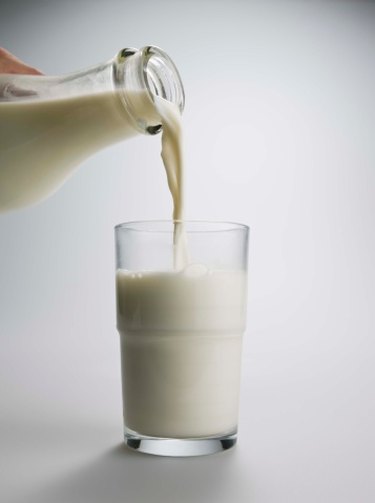
Although standard cow milk is a dairy product many people know about, other types of milk exist that may provide a number of distinct nutritional benefits. Kefir is a beverage made from kefir grains and the milk of sheep, goats or cows, while buttermilk is a fermented product that is created by increasing the acidity of cow's milk. Kefir and buttermilk can be found in many grocery stores and specialty food shops.
Calorie Content
Video of the Day
Kefir and buttermilk have nearly the same amount of calories. An 8-ounce serving of kefir provides 162 calories, while an 8-ounce serving of buttermilk provides 150 calories. The difference of 12 calories between kefir and buttermilk is unlikely to be significant, even if you are dieting, as the amount is less than 1 percent of the daily suggested intake of 2,000 calories.
Video of the Day
Fat Content
Both kefir and buttermilk have the same fat content, with 8 grams in an 8-ounce serving. Of this fat, 5 grams comes from saturated fat, a type of fat considered unhealthy because it adversely affects your cholesterol levels. The American Heart Association suggests limiting saturated fat intake to less than 16 grams per day, so an 8-ounce serving of kefir or buttermilk would contribute more about 31 percent of that amount.
Carbohydrate Content
Kefir and buttermilk have slightly different concentrations of carbohydrates. Buttermilk is the lower carbohydrate option, as it provides 13 grams of carbohydrates per 8-ounce serving, compared to the 15 grams in an 8-ounce serving of kefir. The difference comes from the grains used to make kefir, as this adds 3 grams of dietary fiber. Dietary fiber aids in digestion and promotes increased feelings of satiety.
Protein Content
Protein is an essential nutrient that your body uses to build and repair cells and tissues. Kefir and buttermilk contain the same amount of protein, 8 grams in an 8-ounce serving. Medline Plus suggests consuming 50 to 65 grams of protein each day, as your body can't store this nutrient for later use or times of inadequate intake. If you want to significantly increase the amount of protein in your diet, consuming foods such as poultry, red meat and seafood will be more efficient than consuming kefir and buttermilk. For example, a 4-ounce serving of chicken breast provides 27 grams of protein, more than three times the amount in 8 ounces of kefir or buttermilk.